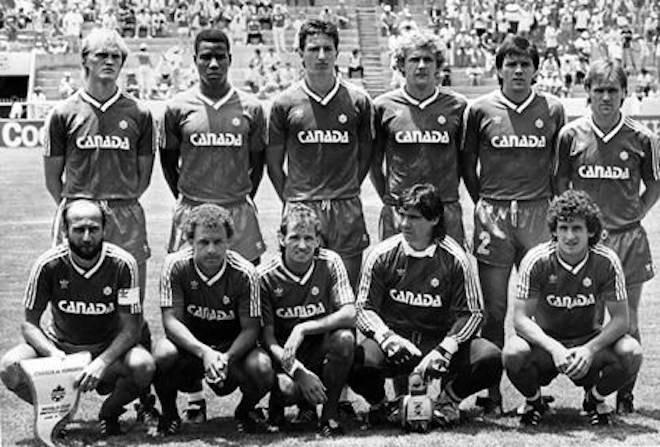Canadian head coach Tony Waiters knew what he wanted when he prepared his team for the 1986 World Cup in Mexico.
The players would be fit and well organized. The team would be difficult to play against and create opportunities from set pieces.
Waiters also knew what he didn’t want.
“In 1982 El Salvador got beat 10-1 by Hungry,” Waiters said. “I wanted to make sure that didn’t happen to us.”
Carl Valentine, a striker on that 1986 team, remembers standing in the tunnel prior to Canada’s opening Group C match against France. A favourite to win the World Cup that year, the reigning European champions had a lineup featuring players like Michel Platini, Jean Tigana and Alain Giresse.
“That moment being in the tunnel makes it real,” said Valentine. “Then you are thinking ‘oh my God, don’t embarrass ourselves.’
“We didn’t score a goal, but we didn’t get blown out.”
It’s been 32 years since Canada qualified for its only World Cup. Members of that team recently gathered in Vancouver to reminisce about the past and talk about the excitement of Canada being a co-host for the 2026 FIFA World Cup.
“This is kind of an occasion to probably tell the same stories we tell every time we get together,” said Bob Lenarduzzi, a defender in 1986 who would go on to be a national team coach and president of the MLS Vancouver Whitecaps.
The ‘86 team was stocked with several players from the old North American Soccer League which folded in 1984. Waiters, a former goalkeeper who earned five caps for England, coached the 1979 Whitecaps team that won the NASL championship. Valentine and Lenarduzzi played on that team.
The groundwork for the World Cup was laid at the 1984 Olympics where Canada lost to Brazil in a shootout in the quarterfinals.
“That gave us a lot of momentum and I think we carried that into qualifying,” said striker Dale Mitchell, who would go on to coach the Canadian national team.
Related: England finally wins penalty shootout at World Cup
Related: US World Cup ratings down 42 per cent without American team
To reach the World Cup Canada needed to qualify out of CONCACAF (North America, Central America and the Caribbean). With host Mexico automatically granted a berth, Canada was one of 17 teams battling for the final spot.
The Canadians punched their ticket to Mexico with a 2-1 win over Honduras on Sept 14, 1985 in St. John’s, N.L.
During the qualifying matches Waiters had preached taking space away from opponents, especially against teams like Costa Rica and Honduras.
“If you let them play they would kill you, so we didn’t,” he said. “We made life very difficult for them.”
At the time not everyone on the team totally understood Waiters’ strategy.
“I used to think can’t we play just a little bit more,” said Lenarduzzi. “He had a way we were going to play and it was designed to maximize our abilities and not play into the opposition’s hands.”
Goalkeeper Paul Dolan said what the team lacked in skill it compensated for with camaraderie.
“We were a brotherhood,” he said. “We knew we weren’t the most talented team.
“We had a lot of confidence in our abilities and a lot of bond within the players. We played for each other.”
On the bus ride to the opening game against the Mexico fans along the route held up their hands indicating how many goals each team would score.
“They were using two hands for France and none for us,” said Lenarduzzi.
A disciplined Canadian team gave the French all they could handle. Initially nervous, Dolan relaxed and soaked in the moment.
“Where you might have had fear and just wanted to get the game over, I enjoyed it,” he said.
Canada missed several good scoring chances early. As the match progressed it looked like the sides would settle for a 0-0 draw. In the 78th minute a Canadian defensive lapse allowed France’s Jean-Pierre Papin to score.
Canada would lose the next game 2-0 to Hungary. Waiters said some Canadian Soccer Association officials returned home even though Canada still had a mathematical chance of advancing.
The final game was a 2-0 loss to Russia. Lenarduzzi came close to scoring Canada’s only World Cup goal.
“I rushed it and stubbed my toe,” he said, “It just kind of caught the ball and it bobbled toward the keeper. I was happy because the keeper actually dived for it to it made it look a little better.”
Walking off the pitch after that final game, the players believed they had planted the seeds for future success. Instead there has been a 30-plus year drought.
“We all felt like we had finally cracked it and we were going to qualify every year,” said Valentine. “That was not bravado. We just felt we were going to qualify for a lot more.”
Looking forward, Mitchell said young players in Canada are receiving better coaching now than in the past. He also believes the creation of the Canadian Premier League, which will begin play next April, will help develop homegrown talent.
“When you get to a certain age it’s about first-team games,” he said.
Waiters would like to see more work done developing soccer in inner-city neighbourhoods.
“That’s where the talent is in Canada today,” he said. “We have to get them into the mainstream.”
Some fans are excited that Canada should automatically earn a berth when it co-hosts the 2026 World Cup. But Dolan, who works with the current national team coached by John Herdman, wants to see Canada qualify for the 2022 tournament.
“I truly believe we can qualify in 2022,” he said. “That needs to be the goal, not a free stop in 2026.”
Jim Morris, The Canadian Press



